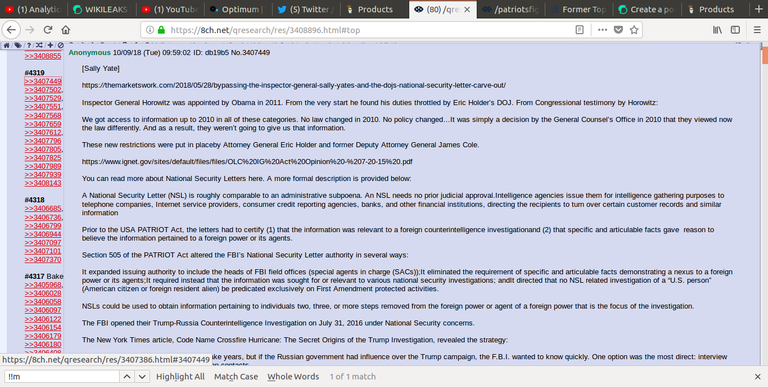%2023:58:37%20No.369.png)
Q !!mG7VJxZNCI 10/08/18 (Mon) 23:58:37 No.369
[Sally Yates]
Q

Anonymous 10/09/18 (Tue) 09:59:02 db19b5 (3) No.3407449>>3407705 >>3407990 >>3408143
[Sally Yate]
Inspector General Horowitz was appointed by Obama in 2011. From the very start he found his duties throttled by Eric Holder’s DOJ. From Congressional testimony by Horowitz:
We got access to information up to 2010 in all of these categories. No law changed in 2010. No policy changed…It was simply a decision by the General Counsel’s Office in 2010 that they viewed now the law differently. And as a result, they weren’t going to give us that information.
These new restrictions were put in placeby Attorney General Eric Holder and former Deputy Attorney General James Cole.
https://www.ignet.gov/sites/default/files/files/OLC%20IG%20Act%20Opinion%20-%207-20-15%20.pdf
You can read more about National Security Letters here. A more formal description is provided below:
A National Security Letter (NSL) is roughly comparable to an administrative subpoena. An NSL needs no prior judicial approval.Intelligence agencies issue them for intelligence gathering purposes to telephone companies, Internet service providers, consumer credit reporting agencies, banks, and other financial institutions, directing the recipients to turn over certain customer records and similar information
Prior to the USA PATRIOT Act, the letters had to certify (1) that the information was relevant to a foreign counterintelligence investigationand (2) that specific and articulable facts gave reason to believe the information pertained to a foreign power or its agents.
Section 505 of the PATRIOT Act altered the FBI’s National Security Letter authority in several ways:
It expanded issuing authority to include the heads of FBI field offices (special agents in charge (SACs));It eliminated the requirement of specific and articulable facts demonstrating a nexus to a foreign power or its agents;It required instead that the information was sought for or relevant to various national security investigations; andIt directed that no NSL related investigation of a “U.S. person” (American citizen or foreign resident alien) be predicated exclusively on First Amendment protected activities.
NSLs could be used to obtain information pertaining to individuals two, three, or more steps removed from the foreign power or agent of a foreign power that is the focus of the investigation.
The FBI opened their Trump-Russia Counterintelligence Investigation on July 31, 2016 under National Security concerns.
The New York Times article, Code Name Crossfire Hurricane: The Secret Origins of the Trump Investigation, revealed the strategy:
Counterintelligence investigations can take years, but if the Russian government had influence over the Trump campaign, the F.B.I. wanted to know quickly. One option was the most direct: interview the campaign officials about their Russian contacts.
Narrator: The FBI was completely uninterested in interviewing witnesses. That was absolutely NOT their goal:
That was discussed but not acted on, two former officials said, because interviewing witnesses or subpoenaing documents might thrust the investigation into public view, exactly what F.B.I. officials were trying to avoid during the heat of the presidential race.
Sally Yates made a fitting appearance:
“You do not take actions that will unnecessarily impact an election,” Sally Q. Yates, the former deputy attorney general, said in an interview. She would not discuss details, but added, “Folks were very careful to make sure that actions that were being taken in connection with that investigation did not become public.”
And the true objective was made clear:
The F.B.I. obtained phone records and other documents using national security letters — a secret type of subpoena — officials said. And at least one government informant met several times with Mr. Page and Mr. Papadopoulos, current and former officials said.
Q said get ready for the sky is falling week. When things start getting declassified, everything will change.